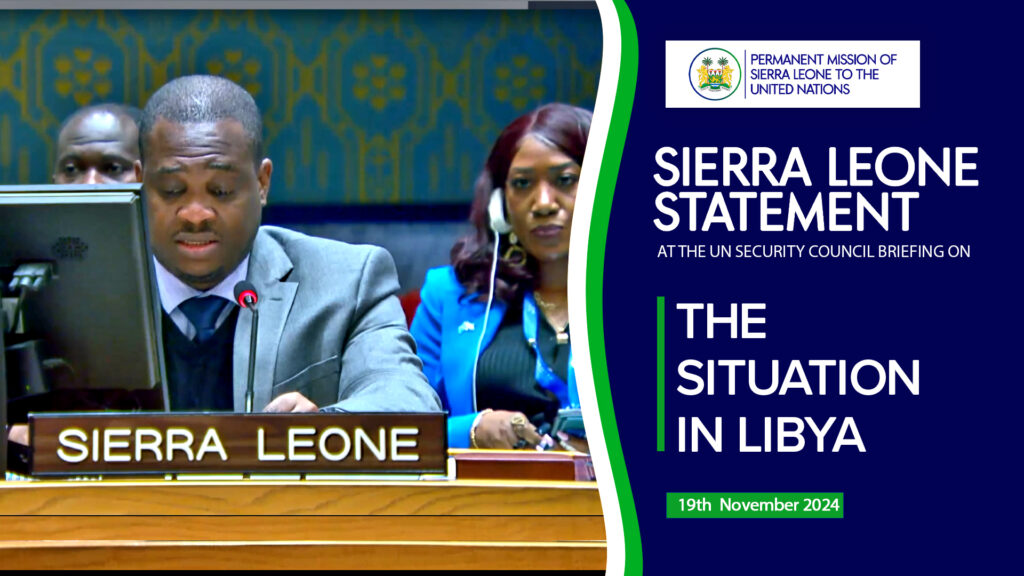STATEMENT BY:
H. E. MR. AMARA S. M. SOWA
AMBASSADOR /DEPUTY PERMANENT REPRESENTATIVE
CHARGE D’AFFAIRES A.I.
Madam President,
I thank Mr. Karim Khan, Prosecutor of the International Criminal Court (ICC), for his informative briefing and for presenting the ICC Prosecutor’s 28th report on the situation in Libya, as mandated by Security Council resolution 1970 (2011).
Sierra Leone commends the Prosecutor and his office for the unwavering commitment to transparency and accountability, as well as for the diligent and consistent efforts over the past six months.
I welcome the participation of the Permanent Representative of Libya in this meeting.
Mr. President,
Sierra Leone reiterates its prioritization of accountability as a means to reinforce the protection of civilians in situations of armed conflict, respect for fundamental human rights, and to end impunity for atrocity crimes. On the Prosecutor’s 28th Report, we would like to emphasize the following five points:
First, we acknowledge with great appreciation the significant progress accomplished under the renewed strategy, including its current focus on the roadmap towards completing investigative activities in addressing the situation in Libya. This progress includes notable milestones such as the unsealing of six arrest warrants related to the crimes that occurred in Tarhunah. These steps are crucial to our collective objective of completing investigative activities by the end of 2025. We believe this target is attainable and are confident that we are making significant progress toward achieving it.
Also, the commitment to accelerating progress across various key lines of inquiry and the enhanced engagement with civil society partners further underscores the Court and OTP’s commitment to justice and accountability – an approach we strongly support.
Second, we commend the improved cooperation between the OTP and the Libyan authorities, exemplified by the recent productive meeting between the Prosecutor and His Excellency Mr. Mohamed Younis Al Menfi. Today’s briefing by the Prosecutor from Libya, marked the second time the Council was briefed from Tripoli, and demonstrates a significant stride in diplomatic relations and operational effectiveness. Additionally, we note with gratitude the vital support extended by the Embassy of Libya to the Netherlands, particularly in facilitating visas and travel logistics for the investigative teams.
Third, we welcome the enhanced collaboration with civil society organizations, which is an essential component of our collective efforts. Over the reporting period, the Office has engaged with more than 70 civil society organisations (CSOs) and human rights groups, leading to the establishment of a mechanism for structured engagement on Libyan matters. This strategic engagement we believe has bolstered the capacity of the Office to provide much-needed psycho-social support to victims and witnesses, ensuring that their voices are not only being heard but their needs are also being addressed.
Fourth, we applaud the OTP for its commitment to a victim-centered approach, particularly through outreach to affected communities, civil society, and non-governmental organizations. We strongly support the Office of the Prosecutor’s ongoing work to protect witnesses and expand efforts in victim support. We further encourage the international community to increase resources for victim-centered programs to bring solace and support to survivors of human rights abuses in Libya.
We are cognizant of the Court’s challenges in Libya, including the complex political landscape. We remain committed to the view that a sustainable solution to the crisis in Libya will ultimately require a political resolution. We urge all Libyan factions to engage in good-faith dialogue and work toward a unified vision for peace. Accountability for grave crimes is a vital component in this journey to lasting peace, as justice serves not only as a deterrent but also as a foundation for reconciliation. We therefore call on this Council and all states involved to support Libya’s political transition and efforts to build institutions that uphold justice and respect for human rights.
Similarly, we recognize the indispensable necessity for the OTP to receive adequate resourcing and staffing to sustain its important work. In this vein, we welcome the Office’s request for additional resources from the Assembly of States Parties to address the unprecedented intensity of its investigative activities. The secondment of national experts has proven to be significantly beneficial, and we welcome further contributions of expertise to enhance the Office’s efforts in Libya. For our part, we will continue to support these endeavors with unwavering commitment to justice and the rule of law.
Our final point is that we are reminded of the importance of protecting the Court, its personnel, and all individuals cooperating with the Court from any form of threat or intimidation. We condemn any act of harassment or hostility directed toward the Court and underscore the need for international cooperation to safeguard the Court’s impartiality, independence, and mandate. Any attack on the Court or its officers represents an attack on the rule of law and the collective commitment to international justice. In this regard, we reaffirm our unwavering dedication to uphold and defend the principles enshrined in the Rome Statute, and ensuring the Court’s integrity remains steadfast despite the increasing threats of unilateral sanctions or actions taken against it or its supporters.
Madam President,
We believe States should have a primary responsibility to deliver justice and accountability to their people. If they lack the capacity or resources, we encourage cooperation with international partners in this endeavor. In this regard, we reaffirm our support for the people of Libya in pursuing accountability and justice within the broader framework of the peace process.
We also reiterate the application of the principle of complementarity, emphasizing its integral role in combating heinous crimes and fostering bilateral engagement between the Court, Libyan authorities, neighboring States, and civil society groups in Libya.
In closing, Sierra Leone reaffirms its full support for the International Criminal Court. We reassure the people of Libya of our support and reiterate our commitment to sovereignty, independence and territorial integrity of Libya. Recognizing the importance of working together for justice, we are fully committed to continue playing an active role in this shared endeavor.
I thank you.



